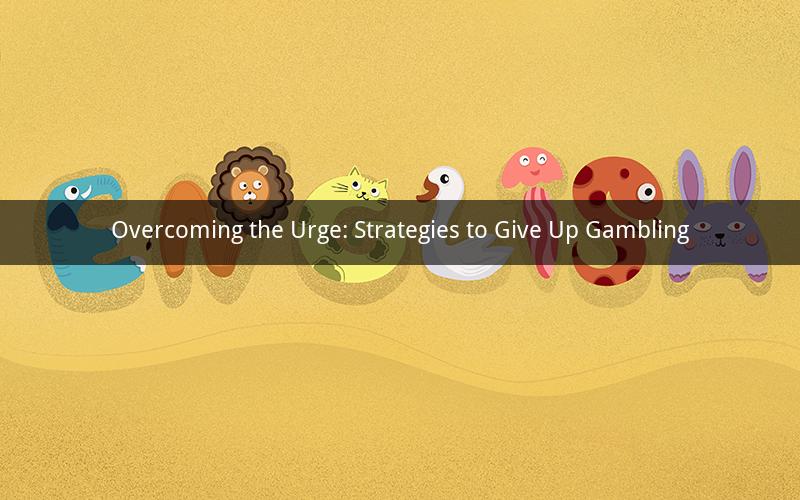
Introduction:
Gambling can be an alluring and potentially addictive activity. However, for those who find themselves trapped in the cycle of gambling, breaking free from this habit can be challenging. This article aims to provide practical strategies and tips on how to give up gambling and regain control over one's life.
1. Identify the Reasons for Gambling:
Understanding the underlying reasons behind your gambling habit is crucial in overcoming it. Ask yourself:
- Why do I gamble?
- Am I seeking an escape from stress or boredom?
- Do I feel the need for excitement or thrill?
Recognizing the root causes will help you address the issues that trigger your gambling behavior.
2. Seek Professional Help:
If you find it difficult to quit gambling on your own, seeking professional help can be beneficial. Consider:
- Therapy: A therapist can help you uncover the emotional or psychological factors contributing to your gambling addiction.
- Support groups: Joining a support group like Gamblers Anonymous can provide you with a sense of community and understanding.
3. Create a Support System:
Surround yourself with individuals who understand and support your journey to quit gambling. This can include:
- Family and friends: Share your struggles with those who care about you and ask for their support.
- Support groups: Attend meetings or online forums where you can connect with others who are going through similar challenges.
4. Establish a Budget and Set Limits:
To control your gambling habits, it's essential to establish a budget and set strict limits. Consider:
- Limiting the amount of money you allocate for gambling.
- Setting time limits for gambling sessions.
- Avoiding high-risk gambling activities that can lead to significant financial losses.
5. Find Alternative Activities:
Identifying and engaging in alternative activities can help you replace the urge to gamble with more productive and enjoyable pursuits. Consider:
- Hobbies: Explore new hobbies or revisit old ones that you enjoy.
- Exercise: Regular physical activity can improve your mood and reduce stress.
- Socializing: Spend time with friends and family, participate in social events, or join clubs.
6. Develop Coping Mechanisms:
Learning to cope with triggers and stressors without turning to gambling is essential. Consider:
- Mindfulness and relaxation techniques: Practices such as meditation, deep breathing exercises, or yoga can help you stay grounded and calm.
- Distraction techniques: When the urge to gamble arises, find ways to distract yourself, such as engaging in a different activity or calling a friend.
7. Monitor Your Progress:
Tracking your progress is crucial in maintaining your commitment to quit gambling. Consider:
- Keeping a journal: Document your thoughts, feelings, and progress.
- Setting milestones: Establish short-term and long-term goals to stay motivated.
- Celebrating achievements: Acknowledge and celebrate your successes along the way.
8. Stay Committed:
Quitting gambling is a journey that requires dedication and perseverance. Remember:
- Relapses are normal: Don't be discouraged if you slip up. Learn from your mistakes and keep moving forward.
- Stay focused on your reasons for quitting: Remind yourself why you want to overcome this habit and the positive changes it will bring to your life.
Conclusion:
Overcoming a gambling addiction can be challenging, but with determination and the right strategies, it is possible. By identifying the reasons for your gambling, seeking professional help, creating a support system, and finding alternative activities, you can gradually break free from this habit and regain control over your life.
Questions and Answers:
1. Q: How can I stay motivated to quit gambling?
A: Set clear goals, celebrate your achievements, and remind yourself of the positive changes quitting gambling will bring to your life.
2. Q: Can I still enjoy gambling responsibly if I have a gambling addiction?
A: It is challenging to enjoy gambling responsibly while struggling with an addiction. It's best to focus on quitting gambling entirely to avoid falling back into old patterns.
3. Q: Will I always be at risk of relapse after quitting gambling?
A: Relapse is possible, but with ongoing support and a strong commitment to recovery, you can minimize the risk and overcome relapses.
4. Q: Can my family and friends help me quit gambling?
A: Absolutely! Your loved ones can provide emotional support, hold you accountable, and celebrate your progress along the way.
5. Q: Is there a specific time frame for quitting gambling?
A: There is no one-size-fits-all answer. The time it takes to quit gambling varies for each individual. Focus on your own progress and be patient with yourself throughout the journey.